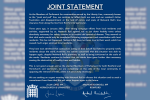
The Government recently announced that they have delivered on a key manifesto commitment to recruit 26,000 additional primary care professionals – ranging from paramedics to dietitians and physiotherapists – with at least 4,246 of these in London. These staff will be working in GP practices with doctors and nurses to help provided much needed care to patients.
Locally, this recruitment drive has seen the addition of 670 primary care staff across the North East London region, helping to cut waiting lists, improve services and assist GP practices throughout Havering and the wider region. Building on these encouraging numbers, the North East London Integrated Care Board (ICB) have confirmed that recruitment to these posts will continue into the future.
This is a year ahead of schedule, with the original pledge stating this would be met by March 2024. This means that since March 2019, there are three and a half times more people working in these roles within GP practices, increasing from 11,500 in 2019 to over 40,600 as of March this year.
Along with meeting this target, the Government continues to work to create more appointments, and recent data shows that as a result of this push there were almost two million more GP appointments delivered this March when compared to last year – meaning a rise of 83,500 more appointments each working day.
The recently published Primary Care Recovery Plan, which you can read here, builds on this and sets out the actions the Government plans to take to make it easier for patients to contact their GP and end the 8am rush for appointments. The Plan includes £240 million funding being given to GP practices across the entire UK this year to help them embrace the latest technology.
Further to this, the way the NHS App and website is used is also expanding to improve how patients choose to receive their care. This will require that patients are offered a choice on where they go for treatment by using the NHS App or website when clinically appropriate. For example, after speaking with their GP, patients will be able to view information for up to five healthcare providers - filtered by distance, waiting times and quality of care, which they can choose between. The NHS App already has 32 million sign ups and allows patients to book and manage their GP appointments, order repeat prescriptions, and access hospital correspondence.
The Department for Health has launched a call for evidence to inform the development of the Major Conditions Strategy. This involves seeking ideas and views on how to prevent, diagnose, treat, and manage the major condition groups that affect the health of many in England. These groups are:
- Cancers
- Cardiovascular diseases (including stroke and diabetes)
- Chronic respiratory diseases
- Dementia
- Mental ill health
- Musculoskeletal disorders
Responses from the cancer and mental health calls for evidence were published at the same time as this wider call for evidence.
The Department are keen to hear from a range of government and health related bodies in this call for evidence and hopes this will also be a key opportunity to hear from individuals sharing their personal experiences of these particular conditions – whether it is as patients, service users or as carers of those suffering from them.
Therefore, if you would like to share your views and experiences relating to any of the condition groups listed, in order to inform this strategy, then you can do so by the following the links provided above, or by clicking here.


